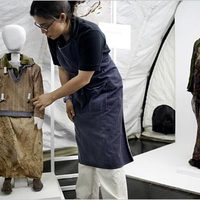Ariana Fernandez
University of Toronto, Political Science, Graduate Student
Forensics anthropology and the letter recognized forensic archaeology are fast becoming known, taught and used to assist medic-legal investigations and those of human rights violations (e.g., genocide, crimes against humanity). This... more
Forensics anthropology and the letter recognized forensic archaeology are fast becoming known, taught and used to assist medic-legal investigations and those of human rights violations (e.g., genocide, crimes against humanity). This article is an introductory description to the fields adding to the very little Spanish literature which currently exists.
Research Interests:
Research Interests:
Cultural objects analysis and recovery of evidence from several mass graves in Iraq excavated during 2005-2007, presented at the SHA Annual Conference, Albuquerque, New Mexico 12 January 2008. The evidence was repatriated in 2007.
Research Interests:
A short essay on Applied Anthropology with a link to Forensic Anthropology, Ethnic Cleansing, and Political Dissidents. The essay is from Michael J Simonton. 21st Century Anthropology: A Reference Handbook. Editor: H James Birx. Volume... more
A short essay on Applied Anthropology with a link to Forensic Anthropology, Ethnic Cleansing, and Political Dissidents. The essay is from Michael J Simonton. 21st Century Anthropology: A Reference Handbook. Editor: H James Birx. Volume 1. Series Thousand Oaks, CA: SAGE Reference, 2010 and seems to be written for undergraduates.
Research Interests:
Kurdistan Regional Government press realease
Research Interests:
My work featured in the NY Times
Research Interests:
My work in Iraq featured in the LA times
